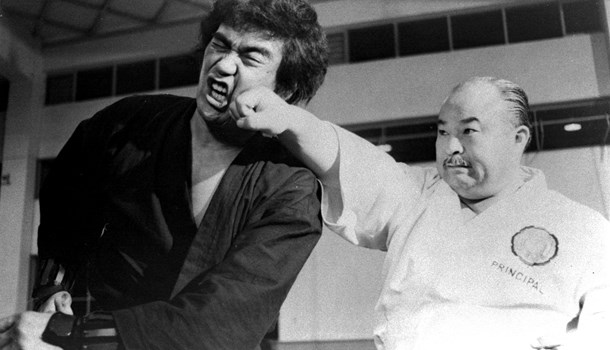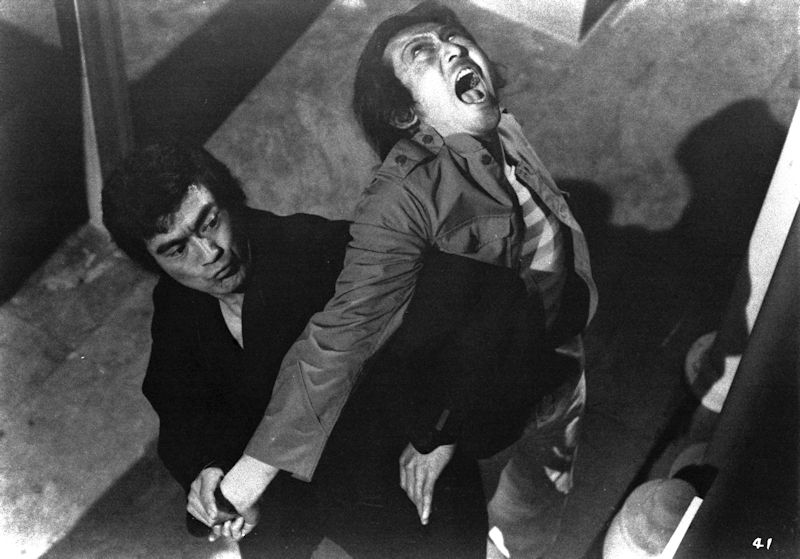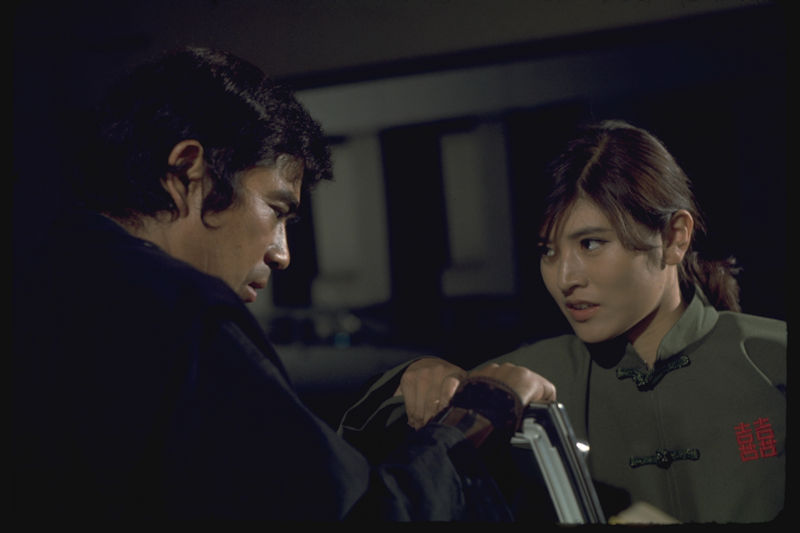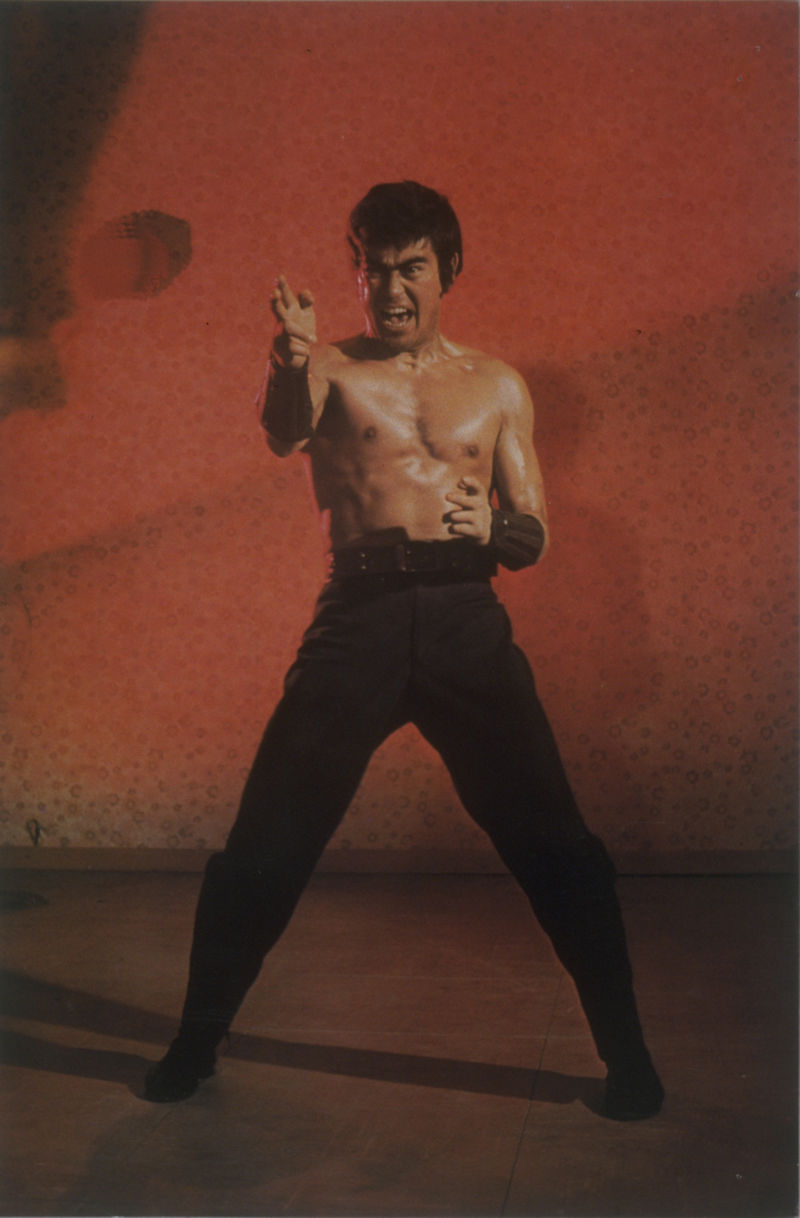
Written by Richard Durrance on 12 Apr 2023
Distributor Arrow Films • Certificate 18 • Price £22
To be honest I'd have to say that The Street Fighter boxset isn’t necessarily my obvious choice for films. Martial arts isn’t a genre that always floats my boat but nor am I disinterested – it's very much a question of how it’s done. Take Bruce Lee; I enjoy Enter the Dragon partly for its sleekness and for Lee’s balletic violence, but his other films left me cold; yet I also vastly enjoy the sophisticated elegance of King Hu’s Wuxia films, with their visual splendour, wit and superb narrative pacing.
So... shall we begin? Yes, with The Street Fighter (not to be confused with a certain arcade game that began when I was a kid and yes I do remember those arcade machines in newsagents, I'm that old).
A priest visits a death-row prisoner, Shikenbaru, who has killed many in pursuit of perfecting his karate. But this priest is really Tsurugi (Sonny Chiba), a Street Fighter, paid to help the prisoner escape. A man of few morals, Tsurugi, is then drawn into a plot to kidnap Sarai Hammett, the heir to a billion-dollar oil business, though he must choose sides, whether that of the villainous Hong Kong five-dragons gang that are allied to the mafia, or Sarai and her uncle, Masaoka, who runs the most respected dojo in Japan.
Trying to describe The Street Fighter is like trying to herd cats because the plot is a crazed crash of elements, though watching it I did wonder if there was an attempt to take Kurosawa’s Yojimbo and turn into an amoral martial arts mash-up, I say mash-up because I don’t feel a certain influence of Spaghetti westerns and Clint Eastwood as Dirty Harry Callaghan – this seems reflected in the score which feels like a mixture of Lalo Schifrin and Ennio Morricone. Right from the start what surprised me was that I was thinking Chiba’s Tsurugi would be a good guy, but he’s arguably an utter bastard. So much so, he makes Dirty Harry look like an angel. He’ll happily sell a client’s sister into prostitution if they cannot pay their bill. Chances are if he sees a woman, he grabs them and kisses them without their volition. The only thing that makes you think Tsurugi might be some kind of hero is because of his friend, Rakuda, an almost comic foil who looks after him, though for most of the film you have no idea why.
The Street Fighter becomes a great vehicle for Chiba’s crunching brand of violence - the character matches Chiba’s nigh animal presence. There is something feral about him (no wonder he was in Wolf Guy) and just as Bruce Lee was balletic but deadly, Chiba genuinely sells that he can crush bones, crack ribs, gouge eyes and tear off body parts. He has a certain animal desire to survive and a sheer physical presence that simply "is". Much of the plot revolves around putting Chiba into situations where he can kick a lot of arse. A good thing, too, because it’s fair to say that our heir to billions (and I think this film was made in the 70's) seems about the dumbest damn person in history, and the most poorly protected!
But no matter because her enemies also turn out (mainly) to be Tsurugi’s too, and so the narrative takes us across Japan, onto the high seas, and to an extent a partial redemption of Tsurugi. I say partial because he ends up being the least villainous man on screen, but arguably by a narrow margin. This approach means there is no needless sentimentality in which to wallow, instead the film is remorseless in its action, yet it also never gets lost in it. I remember watching Ong-Bak all those years ago with Tony Jaa doing remarkable acts of martials arts yet everything he did was then repeated twice, from different angles, in slow motion, just to hammer home how f**king amazing he is, and in the end I wanted to scream because it ended up making it all seem so trivial rather than remarkable. In contrast The Street Fighter just focuses on crunching bones and always with a good plot-driven reason, even if the plot is, like many such films, all a bit of a hodge-podge. I mean, it even manages to crowbar in a character that’s essentially Zatoichi’s evil twin.
Yet the film never tries to outlive itself, at 90-minutes it zips by, though towards the end it does feel like some aspects were lost to the cutting room floor, but we forgive this. Harder to forgive is one of the villains, a black guy who barely enters into the film yet when he does his role is to try and rape the woman he’s in the room with. To say it leaves a bad taste would be an understatement. The only thing in its favour is his character is painfully emasculated, though that the one black character in the film is characterised as a rapist, as well as a criminal is hardly enlightened regardless of when the film was made.
Nevertheless, as an introduction to the world of The Street Fighter, it left me intrigued what was to come in the final two films. Regardless even an idiot like me could understand why Chiba is a star, he has a real commitment to the part. Like Lee there is a focus, but rather than Lee's sleekness Chiba instills his character with a sense of animal violence, mixed with a skill that is undeniable and so Chiba as almost the ultimate anti-hero really does work in The Street Fighter. Even down to the ending where you can argue nothing really is sorted except most of the bad guys die as bad guys should. And all those faces you recognise as villains... oh how they are asking for it!

And so we come to Return of The Street Fighter and with it not only a more straightforward plot but more crunching action. Also, it brings back characters from the first, the great karate dojo owner as well as Chiba’s nemesis from the original.
Martial arts master, Otaguro, wants to build the world’s greatest martial arts centre, only he’s extorting money from martial artists worldwide and he just happens to be a front for the mafia who want the money and the power for themselves.
There is something far more hippyish about Return of The Street Fighter, though the cynical end of the hippy movement, where the hippies have realised if you cannot beat them, take their money and as much of it as you can. The narrative compared to the first film is extremely straightforward, almost too much so, though it’s not always the most coherent plot either - it just makes a certain kind of sense. Whereas the first film allows a string of action sequences to run together, here you feel the story has actually been built around action, to the point where towards the end I was trying to remember just who was left alive among the baddies to be bothered about, as there are so many as the film progresses. There’s the feel of "the sequel that just has to be made" and made just that bit too quickly to cash in on the original, and like the Meiko Kaiji Stray Cat Rock series, here the second film often takes sequences from the original to bulk out what is only a short 85-minute film. Admittedly, Return of The Street Fighter doesn’t suggest it has new footage, instead clearly signposting recycled film as flashbacks.
Yet it’s still an entertaining film, mainly again because of Chiba’s crushing action and physical presence. As he mashes his way through a series of bad guys, some barely in passing, it allows you to forget the ostensible police drama that the film starts with, or the child of the dojo owner who is there as an aside for what purpose? Who knows? It doesn’t matter because Chiba gets to stylishly crack more bones. There’s some excellent sequences, especially one in a sauna that has more than a little humour, where a tightly panted Chiba does more damage to people that a mere mortal could hope to manage. The film actually opens well, because it does - as many good sequels should - dispenses with reintroductions and gets straight into the story. There’s no attempt to remind us who Chiba’s Tsurugi is, instead it’s straight into the action, into the story (even if elements get lost, especially the police element - or rather it’s taken up by other characters) and so it sets up a breathless pace that the film almost never refuses to give up. Even later in the film a barely conscious Tsurugi somehow manages to get on his feet, take out a series of villains, take even more physical pain and yet still somehow be both alive and standing. So you have to give the film the credit that you’re totally able to suspend disbelief.
Disbelief is also something I felt for Chiba’s new sidekick, this time hippy-dippy Boke, who may intentionally be irritating for narrative reasons, but my god for almost all the film you just want her to go away. Unlike Rakuda in the first film she’s almost immediately explained away and unlike Rakuda has no charm whatsoever. She faffs about in 70's denim and big shades like she's been smoking a joint or two and seems out of place beside Tsurugi. It’s like she’s been created for an assumed audience... anyway, thankfully she’s often absent and instead we can sit back and watch action in a way we might today with John Wick, with Chiba’s feral charisma to carry the film. Strangely, he’s not as amoral as in the first film, though he’s very much still portrayed as the man who will do anything, or almost anything, for cash. And here at least the character makes sense because he has respect for Masaoka, the head of the dojo. There are lines even Tsurugi will not cross, in part because Masaoka recognises Tsurugi’s potential in the first film.
And so that left the third film, and the third to be directed by Shigehiro Ozawa: The Street Fighter’s Last Revenge.

Once again hired to make the impossible possible, Tsurugi becomes embroiled in the blackmail of a corrupt petrochemical company, a public prosecutor gone bad and in doing so may find the message his father left him.
Like many films when it comes to sequels what tends to occur is a certain baroque absurdism; you see it in the second Lady Snowblood film and here too, there are strands of introducing elements that wouldn't have fit in the prior films: the American wannabe-magician laser-wielding mariachi dressed martial artist villain that hovers around the edges; there’s also the sex, something that slips into the second film and often punctuates The Street Fighter’s Last Revenge; I say this because often it’s used to move the story forward as well as giving a flash of tits: let’s have Tsurugi once again fall for the sister, Aya, of the bad guy though surely he realises the money he’s after is going to go walk about again?
Oh, it does?
Not that it really matters as The Street Fighter’s Last Revenge is really up for giving fan service; lots more crunch action sequences and it works, in part because it has continuity, both with Tsurugi as being himself a mainly amoral character but also he returns to Masaoka’s dojo, the friend of his dead father, and again there is a sense of the story actually linking back to the first two films. While that may seem a small thing, it matters to me in watching a character that doesn’t need to be re-evaluated or changed: Tsurugi is just the same force of nature he always was, yet also he changes a little, just a little, but it is enough to give substance to the bone crushing, blood spilling action. And of course in the middle of it all is Chiba who always looks ready to dish out and take the pain. The presence of Reiko Ike, she of Female Yakuza Tale and Sex and Fury is a welcome addition because as the villain's sister, Aya, as she brings more to the character than you might hope, simply because she has a comfort on screen and an ability to draw the attention (and I don’t just mean with her clothes off).
As a whole, the trilogy of films was not surprising, delivering everything promised. But it is a series I perhaps enjoyed more than I expected to. The films are all either 90-minutes or under and never try to overstay their welcome. Though the plots can sometimes be needlessly convoluted they never lose their focus on being vehicles for action that are never gratuitous nor purely cosmetic. At the heart of it all is a rather intriguing character in the street fighter, Tsurugi; though he may start the series happily pimping those who cannot pay their bills, he legitimately moves on without becoming a hero. There’s an honesty to it all that is refreshing.
In the director, Ozawa, arguably Chiba doesn’t have his most iconoclastic collaborator (despite the infamous x-ray shot) though there are more than enough stylish moments to enjoy here, even if these are often similar to other films of the period. The vertiginous angles were particularly popular at the time, yet he handles it all as well as you can hope for a journeyman director never getting in the way of what matters - Chiba causing all kinds of violent hell.


Long-time anime dilettante and general lover of cinema. Obsessive re-watcher of 'stuff'. Has issues with dubs. Will go off on tangents about other things that no one else cares about but is sadly passionate about. (Also, parentheses come as standard.) Looks curiously like Jo Shishido, hamster cheeks and all.
posted by Richard Durrance on 08 Jan 2026
posted by Richard Durrance on 17 Dec 2025
posted by Richard Durrance on 12 Dec 2025
posted by Ross Locksley on 09 Dec 2025
posted by Richard Durrance on 28 Nov 2025
posted by Richard Durrance on 25 Nov 2025
posted by Richard Durrance on 18 Nov 2025
posted by Richard Durrance on 14 Nov 2025